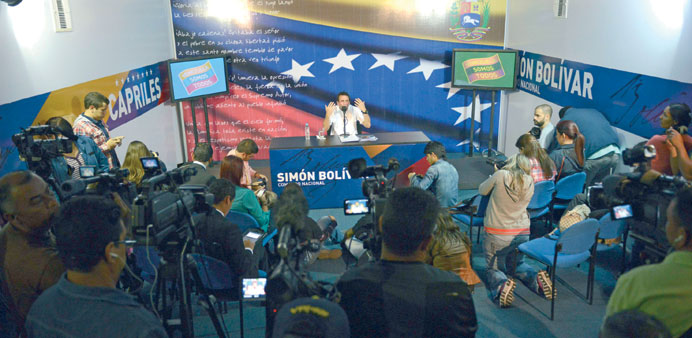AFP/Caracas
Venezuelan opposition leader Henrique Capriles, refusing to concede defeat, accused Nicolas Maduro’s government on Wednesday of stealing the country’s recent presidential elections.
“The truth – and it is as big as our country is wide – is that you stole the election. That is the truth. You stole this electoral process, and you have to explain that to this country and to the world,” a defiant Capriles told a news conference.
Maduro, Hugo Chavez’s political heir, won the April 14 elections to replace the late leader by a very narrow 1.8%, according to the National Electoral Board.
But opposition members allege cases of fraud, claiming some voters cast multiple ballots or even used ballots belonging to people who had died.
Capriles demanded that the National Electoral Board begin reviewing the balloting process and electoral proceedings. He wants a full recount, which the board says is legally impossible.
“We are giving you your deadline: it’s tomorrow. We are not going to wait any more,” Capriles said in a nationally televised address. “You (the board) made a commitment to the Venezuelan people. Well, I made a commitment to the Venezuelan people too.”
Maduro quickly returned fire on his Twitter account.
“#DefeatingFascism We will not permit the Right to once again sabotage the life of a country with its hatred and desperation. Firmness and Victory...” read one of his angry replies.
“#TROOPS #TROOPS #TROOPS Charge forward with the Truth against the Fascism which is Threatening our Fatherland again. Enough of threats already. Justice...” read another.
The electoral board had agreed last week to a partial review of ballots, yet all the while insisting that whatever the outcome, it would not, and could not, change the outcome of the election.
The board also never said when the partial electoral review would begin.
The dispute over the election has plunged the South American OPEC member sitting atop the world’s largest proven crude reserves into political uncertainty.
Just as Capriles challenged the government, television transmission of his speech was interrupted by mandatory government broadcasting on all TV and radio networks.
The interruption showed video footage in which Capriles was blamed for unleashing post-electoral violence that left nine dead and scores wounded.
In reaction to the cutoff, some Capriles supporters immediately started a pot-banging demonstration in some areas of Caracas.
“So why is the (government) feed being piped in now? To keep people from hearing the truth?” Capriles asked, claiming the interruption was another clear sign of the government’s fear that the people would learn the truth.
“The truth will make this government fall,” he added. “When the truth is out, this government will fall in a matter of minutes. They are trying to hold on (to power) with threats and persecution.”
Political tensions had already soared earlier on Wednesday when both the government and Capriles called massive street rallies for May 1.
Venezuela detains US citizen accused of fomenting opposition
Venezuela has detained an American citizen it says was financing opposition student demonstrations after this month’s disputed presidential election, the latest in a flurry of accusations over last week’s post-vote violence.
Interior Minister Miguel Rodriguez said Timothy Hallet Tracy had been seeking to destabilise the country on behalf of an unnamed US intelligence agency after President Nicolas Maduro’s narrow presidential victory.
“We detected the presence of an American who began developing close relations with these (students),” said Rodriguez in a press conference. “His actions clearly show training as an intelligence agent, there can be no doubt about it. He knows how to work in clandestine operations.”
Rodriguez said Tracy, age 35 from Michigan, had received financing from a foreign non-profit organisation and had redirected those funds toward student organisations.
The ultimate aim was to provoke “civil war”, he said.
Rodriguez showed a video he said was taken by the students themselves, in which a group of young people are heard discussing money.
A US embassy official had no immediately comment on the announcement.
Opposition challenger Henrique Capriles refused to accept the result of the April 14 vote without a full recount, and the following day opposition sympathizers burned tires and threw rocks at security forces in protest.
The government says nine people were killed and numerous government clinics were attacked, but the opposition calls the official version of the events a politically motivated smear campaign.
The Opec nation has repeatedly accused the US of seeking to destabilise the country after the March 5 death of late socialist leader Hugo Chavez, who was frequently at odds with Washington.

Capriles speaks during a news conference in Caracas on Wednesday.
